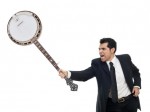by:
Author, Writ of Mandamus
Over two decades ago, an Ohio man bludgeoned his wife to death with a banjo (two banjos to be specific — he broke the first one). According to the Cox News Service report, neighbors were shocked. Other than playing “Fox on the Run” over and over again while attempting to sing all three parts of the harmony by himself, the man seemed normal.
Still, this senseless tragedy set into motion a series of events in which quick and decisive government regulation solved the national epidemic of senseless Bluegrass violence.
According to a recently produced public television documentary, it was a sad time in America’s history when banjos were readily available to any person that happened to wander into a music store. It’s hard to remember such a time, but at one point in our history banjos were not registered. No identification was required to purchase one. No musical aptitude checks were performed on potential owners.
The documentary has to be viewed in the context of the early ’90s, when America’s views toward banjo ownership were different. The movie “Deliverance” was still part of the nation’s psyche and banjo pickers like John Hartford and Grandpa Jones were actually seen as “role models” people wanted their children to emulate.
In response to the senseless Ohio tragedy, Congress (as Congress is prone to do) sprang into action and passed legislation placing a five-day waiting period on the purchase of all banjos. During the waiting period, the government began to check the musical background of all potential banjo owners. Likewise, people wanting to obtain a banjo now had to wait five days to “cool down” their passion for pickin’.
Caught up in the anti-banjo mood, many state legislatures followed the lead of the United States Congress and enacted proactive legislation banning the possession of banjos within 500 feet of schools and churches.
Of course not everyone was entirely happy about the anti-banjo movement. Claiming their constitutional right to play the banjo, conservatives were outraged by Congress’ action. The NRA (National Reel Association) sent out fundraising letters claiming that when banjos were banned only criminals would have banjos — its president threatening that they’d get his banjo when they pried it from his cold dead hands.
Conservative state legislatures thumbed their noses at the federal action and passed legislation allowing people to openly carry banjos concealed in gig bags.
Liberals, on the other hand, felt the federal action did not go far enough and pushed to extend the waiting period to all Bluegrass instruments. They complained about loopholes that allowed people to purchase used banjos at yard sales and flea markets. Under pressure from his major contributors, President Bill Clinton issued an executive order banning the importation of banjolins (an instrument strung like a mandolin, but with a banjo face).
What wasn’t handled by legislation or executive fiat was dealt with by trial lawyers, who began suing banjo manufacturers for the harm inflicted by people who recklessly picked them. The result of those cases: warning labels that banjos are not intended to be used to bludgeon listeners.
In the recent presidential election, both candidates took polarizing positions that only seemed to widen the divide on the issue of private banjo ownership. President Obama belittled those small-minded opponents who still cling to their banjos. The following day, Romney appeared on stage in Nashville, Tennessee, while local pickers played “Dueling Banjos.”
Of course, there are still occasional unfortunate banjo incidents that garner national attention. Few can forget the fun that the late-night talk show hosts had when Vice President Dick Cheney accidentally hit a wealthy contributor over the head with a banjo at an open-mic night in Texas.
The television documentary concluded that swift government action in response to the Ohio banjo incident has probably saved over a million lives.
And who could argue with the numbers? Since the move to enact restrictive legislation, private banjo ownership is way down and Bluegrass-related violence has been on a steady decline. But the number of incidents involving unregulated Mariachi instruments illegally transported across the Mexican border continues to rise.
Rick Robinson is the author of political thrillers which can be purchased on Amazon and at book stores everywhere. His latest novel, Manifest Destiny has won seven writing awards, including Best Fiction at the Paris Book Festival.


 The Aspen Daily News reported "The banjo is considered "a deadly weapon" under Colorado law". On New Year’s Eve, Joseph Stancato of Denver allegedly struck another man in the head with his banjo after a minor altercation District Judge James Boyd has approved Stancato’s request to be allowed to tour with his band while awaiting his court date. If convicted of assault with a deadly banjo, Stancato could be imprisoned.
The Aspen Daily News reported "The banjo is considered "a deadly weapon" under Colorado law". On New Year’s Eve, Joseph Stancato of Denver allegedly struck another man in the head with his banjo after a minor altercation District Judge James Boyd has approved Stancato’s request to be allowed to tour with his band while awaiting his court date. If convicted of assault with a deadly banjo, Stancato could be imprisoned.
 By
By  Here’s
Here’s
No comments:
Post a Comment